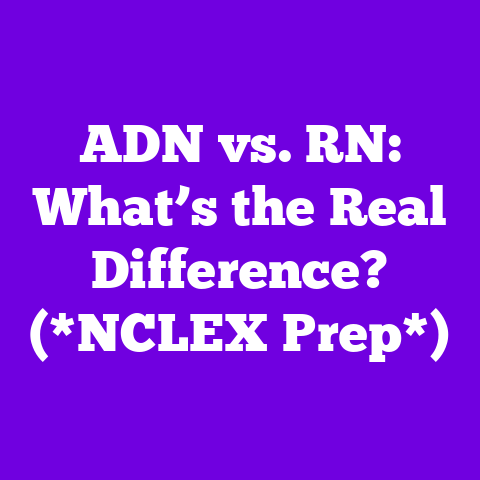Holistic Nutrition Master’s: Is it worth it? (Future Trends!)
Here’s the article you requested:
Holistic Nutrition Master’s: Is It Worth It? (Future Trends! 2025)
Introduction: The Trendsetter’s Choice
Imagine someone like Ella, a vibrant health influencer.
She has a massive following on Instagram, a successful line of organic supplements, and regularly hosts wellness retreats in Bali.
What’s her secret?
Beyond her infectious energy and passion for healthy living, Ella holds a Master’s in Holistic Nutrition.
This degree gave her the scientific foundation to back up her wellness advice, the credibility to launch her brand, and the holistic perspective to truly transform people’s lives.
Ella’s story isn’t unique.
More and more individuals are seeking holistic approaches to health and wellness, driving demand for qualified professionals like Ella.
So, the big question is: Is a Master’s in Holistic Nutrition worth it?
Let’s dive in and explore the future trends shaping this exciting field!
Section 1: Understanding Holistic Nutrition
Okay, so what exactly is holistic nutrition?
It’s more than just counting calories or following the latest diet fad.
Holistic nutrition is about nourishing the whole person – body, mind, and spirit.
Core Principles:
- Bio-individuality: Recognizing that everyone’s nutritional needs are unique.
- Food as Medicine: Using food to prevent and treat illness.
- Whole Foods Focus: Emphasizing minimally processed, nutrient-dense foods.
- Lifestyle Integration: Incorporating exercise, stress management, and mindfulness.
- Interconnectedness: Understanding how nutrition impacts all aspects of health.
Traditional vs. Holistic Nutrition:
Holistic nutrition goes beyond just what you eat.
It’s about how you eat, why you eat, and the environment surrounding your meals.
It acknowledges that stress, relationships, and even your career can impact your nutritional status.
Treating the Whole Person:
Imagine a client struggling with digestive issues.
A traditional nutritionist might focus solely on dietary changes to alleviate the symptoms.
A holistic nutritionist, however, would dig deeper.
They might explore the client’s stress levels, sleep patterns, and emotional well-being to identify underlying factors contributing to their gut problems.
Section 2: The Evolution of Holistic Nutrition Education
Holistic nutrition education hasn’t always been mainstream.
It started as a niche movement, often outside traditional academic institutions.
However, over the years, it has gained recognition and credibility, leading to the development of more formal programs.
A Brief History:
- Early Days: Pioneering individuals and organizations promoted natural healing and whole-food diets.
- Growth of Alternative Medicine: Increased interest in alternative therapies fueled the demand for holistic nutrition education.
- Emergence of Master’s Programs: Universities and colleges began offering Master’s degrees in holistic nutrition to meet the growing demand.
Key Institutions and Programs:
Several institutions now offer reputable Master’s programs in Holistic Nutrition.
Examples include:
- Maryland University of Integrative Health (MUIH): Offers a Master of Science in Nutrition and Integrative Health.
- Bastyr University: Known for its Master of Science in Nutrition for Wellness.
- National University of Natural Medicine (NUNM): Provides a Master of Science in Nutrition.
These programs typically include coursework in areas like:
- Advanced Nutrition Science
- Herbal Medicine
- Integrative Physiology
- Counseling and Communication Skills
- Research Methods
Curriculum Highlights:
What makes these programs unique?
They often incorporate:
- Experiential Learning: Hands-on cooking classes, clinical rotations, and community outreach projects.
- Integrative Modalities: Exploration of complementary therapies like acupuncture, massage, and mindfulness.
- Personalized Nutrition: Emphasis on creating individualized nutrition plans based on client needs.
For example, at MUIH, students can specialize in areas like herbal medicine or nutrition education, tailoring their studies to their specific interests and career goals.
Section 3: Career Opportunities with a Master’s in Holistic Nutrition
Okay, you’ve got the degree. Now what?
A Master’s in Holistic Nutrition can open doors to a wide range of exciting career paths.
Potential Career Paths:
- Holistic Nutritionist: Provide personalized nutrition counseling to individuals and groups.
- Health Coach: Guide clients in making sustainable lifestyle changes to improve their health and well-being.
- Wellness Consultant: Develop and implement wellness programs for corporations and organizations.
- Nutrition Educator: Teach nutrition classes in schools, community centers, and online platforms.
- Integrative Practitioner: Work alongside other healthcare professionals in integrative clinics and hospitals.
- Food Industry Consultant: Develop healthier food products and advise food companies on nutrition labeling and marketing.
- Writer/Blogger/Influencer: Create content about holistic nutrition for online and print publications.
Job Growth and Demand:
The job market for nutrition professionals is projected to grow significantly in the coming years.
According to the U.S.
Bureau of Labor Statistics, employment of dietitians and nutritionists is projected to grow 7 percent from 2024 to 2034, about as fast as the average for all occupations.
This growth is driven by increased awareness of the importance of nutrition for health and disease prevention, as well as the aging population’s need for nutrition support.
Success Stories:
I’ve seen firsthand how a Master’s in Holistic Nutrition can transform careers.
For example, I know a graduate who started her own private practice and now has a waitlist of clients eager to work with her.
Another graduate is working as a wellness consultant for a major tech company, helping employees improve their health and productivity.
These stories demonstrate the real-world impact of this degree.
Section 4: Financial Considerations and Return on Investment (ROI)
Let’s talk money.
A Master’s degree is a significant investment, so it’s important to consider the costs and potential returns.
Cost of Education:
Tuition for a Master’s in Holistic Nutrition can vary widely depending on the institution.
Generally, you can expect to pay anywhere from \$20,000 to \$60,000 for a two-year program.
In addition to tuition, you’ll also need to factor in the cost of books, fees, and living expenses.
Salary Potential:
The salary range for holistic nutrition professionals also varies depending on experience, location, and career path.
According to ZipRecruiter, the average salary for a holistic nutritionist in the United States is \$65,000 per year.
However, some experienced practitioners can earn upwards of \$80,000 or more.
Long-Term Financial Benefits:
While the initial investment may seem daunting, a Master’s degree can lead to increased earning potential and career advancement opportunities.
It can also provide you with the skills and knowledge to start your own business, which can be a lucrative endeavor.
ROI Considerations:
When evaluating the ROI of a Master’s in Holistic Nutrition, consider factors such as:
- Increased Earning Potential: How much more can you earn with a Master’s degree compared to a Bachelor’s degree or other certifications?
- Career Advancement Opportunities: Will a Master’s degree help you advance to higher-level positions or start your own business?
- Personal Fulfillment: How much do you value the knowledge, skills, and personal growth you’ll gain from the program?
Ultimately, the decision of whether or not to pursue a Master’s degree is a personal one.
Weigh the costs and benefits carefully and consider your own career goals and aspirations.
Section 5: Future Trends in Holistic Nutrition (2025 and Beyond)
The field of holistic nutrition is constantly evolving.
Here are some emerging trends that are likely to shape the future of the field:
Key Trends:
- Mental Health Awareness: Increased recognition of the connection between nutrition and mental health.
- Plant-Based Diets: Growing popularity of plant-based eating patterns for health and sustainability.
- Personalized Nutrition: Use of technology and data to create individualized nutrition plans.
- Gut Health Focus: Emphasis on the importance of the gut microbiome for overall health.
- Sustainable Nutrition: Focus on environmentally friendly food choices and practices.
Impact on Curriculum:
These trends are likely to influence the curriculum of Master’s programs in the coming years.
For example, programs may incorporate more coursework on:
- Nutritional Psychiatry: The use of nutrition to treat mental health disorders.
- Plant-Based Nutrition: The science and practice of plant-based diets.
- Nutrigenomics: The study of how genes interact with nutrients.
- Microbiome Science: The role of the gut microbiome in health and disease.
Societal Changes:
Societal changes are also driving demand for holistic nutrition professionals.
The growing focus on wellness, sustainability, and preventive healthcare is creating new opportunities for graduates.
For example, corporations are increasingly investing in wellness programs for their employees, creating demand for wellness consultants and nutrition educators.
Section 6: The Global Perspective
Holistic nutrition is practiced differently around the world, reflecting diverse cultural traditions and dietary patterns.
International Approaches:
- Traditional Chinese Medicine (TCM): Emphasizes the balance of energy (Qi) and the use of herbs and acupuncture to promote health.
- Ayurveda: An ancient Indian system of medicine that focuses on balancing the body’s three doshas (Vata, Pitta, and Kapha) through diet, lifestyle, and herbal remedies.
- Mediterranean Diet: A traditional dietary pattern rich in fruits, vegetables, olive oil, and fish, associated with numerous health benefits.
Globalization of Wellness:
The globalization of wellness practices is leading to cross-cultural exchange and innovation in the field of holistic nutrition.
For example, the popularity of yoga and mindfulness practices has influenced the way holistic nutrition professionals approach stress management and emotional well-being.
Future Job Opportunities:
The globalization of wellness may also create new job opportunities for graduates.
For example, you might work as a nutrition consultant for an international company, developing wellness programs that are tailored to the needs of employees from different cultures.
Section 7: Personal Development and Lifelong Learning
A Master’s in Holistic Nutrition is about more than just career advancement and financial gain.
It’s also about personal growth, enhanced knowledge, and the ability to make a positive impact on others’ lives.
Non-Monetary Benefits:
- Increased Knowledge: Gain a deeper understanding of nutrition science, holistic health principles, and integrative therapies.
- Enhanced Skills: Develop skills in nutrition counseling, health coaching, and program development.
- Personal Growth: Improve your own health and well-being through the application of holistic principles.
- Positive Impact: Help others achieve their health goals and live healthier, happier lives.
Continual Education:
The field of nutrition is constantly evolving, so it’s important to stay updated with the latest research and trends.
Attend conferences, read journals, and take continuing education courses to expand your knowledge and skills.
Lifelong Learning:
Embrace a lifelong learning mindset and be open to new ideas and approaches.
The more you learn, the more effective you’ll be as a holistic nutrition professional.
Conclusion: Is It Worth It?
So, is a Master’s in Holistic Nutrition worth it?
The answer depends on your individual goals and aspirations.
If you’re passionate about holistic health, eager to help others, and willing to invest in your education, then a Master’s degree can be a valuable asset.
It can open doors to a wide range of exciting career paths, increase your earning potential, and provide you with the knowledge and skills to make a real difference in the world.
Reflect on Your Goals:
Take some time to reflect on your own career goals and aspirations.
What do you want to achieve in the field of holistic nutrition?
What kind of impact do you want to make?
How will a Master’s degree help you achieve your goals?
The Future is Bright:
The future of holistic nutrition is bright.
As more people seek natural and sustainable approaches to health and wellness, the demand for qualified professionals will continue to grow.
By investing in your education and embracing a lifelong learning mindset, you can play a key role in shaping the future of this exciting field.






